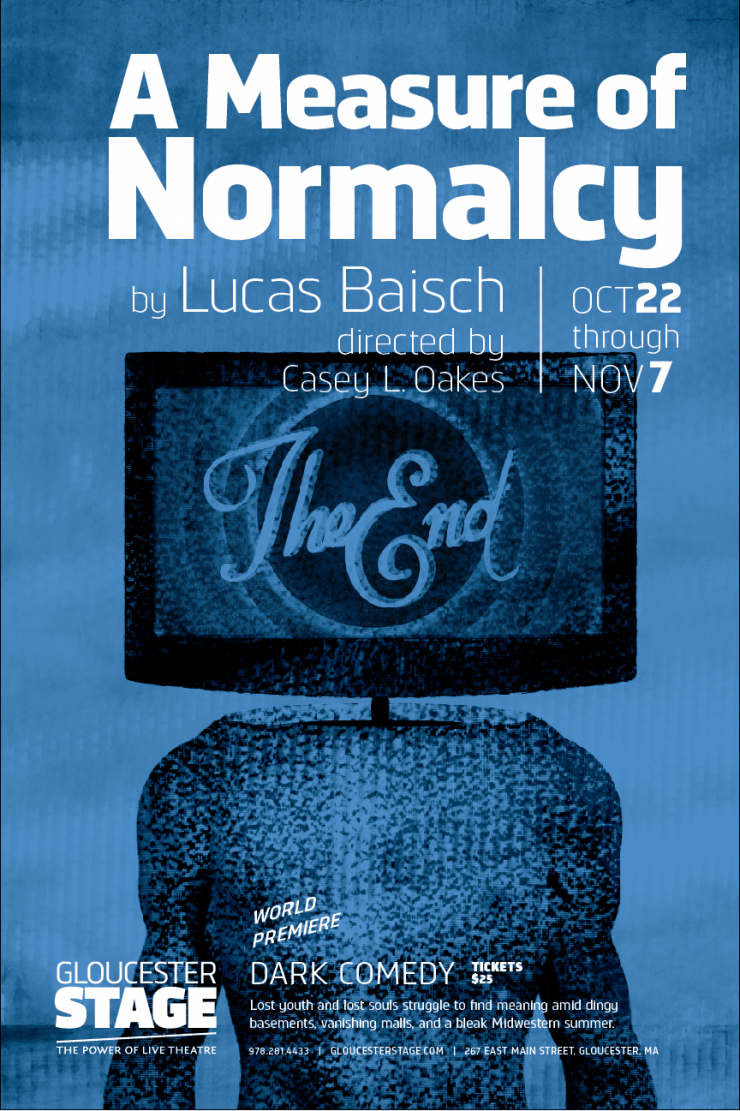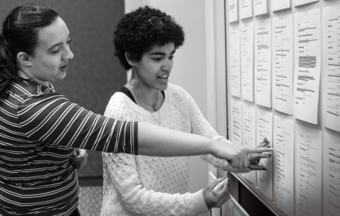The Write Stuff
Exploring Gloucester Stage’s New Playwriting Apprentice Program
Imagine you’re an aspiring playwright who has had tremendous support and positive feedback in college. But now you’re about to graduate; where do you go?
Like most graduates, you have several paths you can choose. You can head directly to graduate school, try to produce your own work, or (gasp!) get that “real job” your parents told you about and try to squeeze in some writing time between shifts at the deep fryer.
When Casey Oakes, Director of Artistic Engagement at Gloucester Stage, and I discussed establishing a new apprentice company for our theatre, we were alarmed by the lack of opportunities for young emerging playwrights. There are many internships and apprenticeships for aspiring stage managers and designers, and a few for aspiring directors, but virtually no programs existed to nurture young playwrights to the point of a full-scale production.
We were determined to change that.
This season, Gloucester Stage, located just outside of Boston, is launching an eight-member apprentice company that includes a playwriting apprentice. What’s unique about this playwriting apprenticeship is that the apprentice’s new play will receive a fully staged, Equity production as part of the theatre’s mainstage season. Not a reading, not a workshop—a full-scale production!
Are we crazy? Probably. But that’s beside the point.
Gloucester Stage was created by playwright Israel Horovitz, who said at its founding that this theatre would be “a safe harbor for new plays and playwrights.” Throughout its thirty-six year history, the theatre has staged more than thirty-two world premieres, many of which moved to Broadway, off-Broadway, regional fame, or were turned into Hollywood films. Taking risks and experimenting with new works is in our DNA and we need to explore and celebrate that.
As a theatre administrator and arts consultant, I have written and spoken frequently about struggling non-profits who, most often, have strayed from their roots. They’ve lost their way, following what usually seemed liked a good idea at the time: the whims of wealthy donors, fads and trends, and the allure of “the sure thing.” The solution to many problems can be found in the organization’s mission—staying true to it, or returning to it. That’s why I feel so confident about the risks associated with this new playwriting apprenticeship. It’s who we are and it’s what we do.
To find the right apprentice, we screened more than sixty applicants from all over the country. They came from a variety of colleges—small and large, private and public—and a variety of backgrounds and communities. Each applicant sent us more than 100 pages of material and an outline of the proposed play they would create while in Gloucester. Casey read every piece of paper that was submitted, and then struggled to narrow the list down to three finalists.
From an artistic perspective, this playwriting apprenticeship is the right thing to do. We not-for-profit theatres have a responsibility to birth and nurture the next generation of theatre artists. Besides, it’s fun to be part of the creation of a new work.
Our interim artistic director Robert Walsh and I read through them and provided feedback to Casey. To ensure fairness, all names and references to gender, race, and college were removed so that we could guarantee we were selecting the writing on its merit and not on outside influences.
The final three candidates received a series of telephone interviews, which made the decision-making process even more difficult. I was delighted to hear such passion and commitment to the art of theatre, and I was comforted knowing that theatre is indeed in good hands with the next generation of artists. When I asked the candidates where they saw themselves in twenty years, they didn’t talk of fame or riches. Instead, they talked of being “working playwrights,” they talked of collaboration and creation, and they were devoid of ego. I was impressed.
Lucas Baisch, the candidate we ultimately chose, is from San Francisco and self-identifies as a queer Latino playwright. The concept Lucas presented to us was for a play called A Measure of Normalcy. It’s fresh, sharp, youthful, and poignant. In it, lost youth and lost souls struggle to find meaning amid dingy basements, vanishing malls, and a bleak Midwestern summer.
When Lucas arrives in Gloucester this month, he will be given several things: housing, a weekly stipend, time and space to write, and access to a large stable of writers, directors, and designers who are ready and willing to help craft this new American play. Throughout the season, as the play develops, we hope to stage a few readings so audiences can follow the work’s genesis leading up to its premiere at the end of October.
A Measure of Normalcy receives what every other play in our seven-show mainstage season receives: an Equity cast, professional designers, a skilled director, and a budget sufficient enough to make it happen. In addition, we have scheduled an extra week of rehearsal so actors, director, and designer have more time to perfect the piece.
We know this won’t be an easy process, but what artistic process ever is easy? We are committed to making it a success and feel as though we have a great community in which to do so. Horovitz is returning this season to direct his new play Gloucester Blue, and our board president Robert Boulrice is a playwright whose work has been produced regionally. The Boston area is home to great theatres like the Huntington and the American Repertory Theatre, and some of the finest universities in the country—Harvard, Emerson, Brandeis, and nearby Brown. This play won’t suck.
I hope our experiment becomes a model for theatres all over the country. From an arts management perspective, it really isn’t much riskier than any other plays you produce, unless every play you produce is a recognizable title or by an author who is a household name.
From an artistic perspective, this playwriting apprenticeship is the right thing to do. We not-for-profit theatres have a responsibility to birth and nurture the next generation of theatre artists. Besides, it’s fun to be part of the creation of a new work.
There are a lot of bright, young minds out there that are ready and eager to work. Do yourself a favor and hire one.














Comments
The article is just the start of the conversation—we want to know what you think about this subject, too! HowlRound is a space for knowledge-sharing, and we welcome spirited, thoughtful, and on-topic dialogue. Find our full comments policy here
I can't wait to hear what happens in Lucas's apprenticeship. Thanks for sharing more about your goals as a company. As another young playwright, it's encouraging to see that not-for-profit theaters do care about the future, about nourishing new voices so they can focus on the labor required to make great new plays.